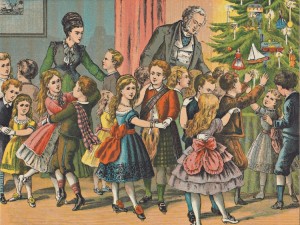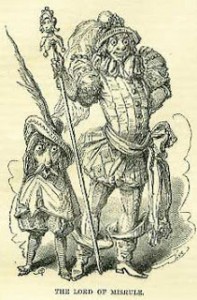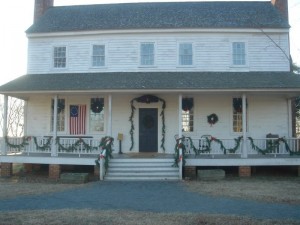From the Vault: I’ve participated in a number of December booksignings at historic sites that date from the time of the American Revolution. Site visitors are often surprised at the simplicity with which the grounds and interiors of historic buildings are decorated for the holiday season. The decor reflects the way people in America approached Christmas during the Revolution. I originally wrote about this simpler approach in 2009 in Mystery Readers Journal, vol 25 no 1. (The pictures weren’t in the original.) What I’ve learned about Yule and Christmas has influenced my personal seasonal celebration. This year, Yule and the winter solstice fall on the same day, 21 December. Seasons greetings to all my readers.
*****
Camp Follower, the third novel in my mystery/suspense series set during the Southern theater of the American Revolutionary War, depicts a Yule celebration in the backcountry of South Carolina.
Why Yule and not Christmas?
Contrary to popular opinion, Christmas wasn’t a big holiday for the Colonials or the occupying British. There was no Christmas tree, no roasted goose, no weeks of baking and flurry of gift giving, no packing the church pews for a joyous Christmas Eve/Day service, no bearded plump guy in a red suit whizzing around the world in a sleigh full of goodies. Decades later, Prince Albert would initiate some of those traditions, then they’d gather momentum over subsequent decades into what we have now. But it wasn’t happening yet during the Revolutionary War years.
Christmas was, in fact, in transition. For centuries, the pagan festival of Saturnalia had been on the Church’s calendar as Christmas. The season was a time of widespread “misrule,” when folks indulged in excessive party behavior that resembled a cross between our modern-day Halloween and Mardi Gras. By the winter solstice each year, the harvests were in, the stock was freshly slaughtered, and the first alcoholic beverages of the season were available. People of all classes had idle time on their hands. Many used it to evaluate a year nearly ended and assess ways to approach the new year. But many commoners also chose to let off steam and vent carnal desires at this time. These people turned class stricture on its head by rioting, destroying property, and indulging in licentious sexual behavior. By custom, commoners often invaded upper class homes in mobs and demanded food and drink. The wealthy provided food and drink for them, a form of largesse, a “treat” to divert a “trick.”
So desperate were the Puritans of Colonial America to distinguish themselves from devotees of this seasonal revelry that they outlawed public celebration and acknowledgement of Christmas within their community for many years. However, not everyone who settled in North America was a Puritan. A number of settlers weren’t even Christians. In the years as the colonies and territories took shape, a range of seasonal celebratory behavior manifested itself in homes and in public.
In December 1780, most people associated with King George III‘s empire, regardless of religion, still honored the ancient, annual rhythm of solstices and equinoxes in some form. Makes sense, when you consider how many of them made a living off the land and thus had to stay attuned to the seasons. For the winter solstice, they might have decorated their homes with some greenery, or had a feast and/or dance on Yule. The winter solstice and Christmas Day occur close together, some years almost atop each other, so those people who were Christians might also have attended a service in church on Christmas Day. But this would have been a somber, simple service with no glitz. Conservative Protestants — especially those of the backcountry, folk persuasion — frowned on making a material big deal over the birth of Jesus, just as the Puritans had discouraged it.
Camp Follower renders Yule as it might have been in 1780, celebrated on what is technically Christmas Eve by a British regiment camped in the hinterlands of South Carolina. The regimental commander entertains his officers and their ladies with a feast, and plenty of food is distributed among the rank and file — echoes back to an age when the lord of the manor distributed largesse among the poor in effort to circumvent their Saturnalia carousing. During the Yule festivity in Camp Follower, everyone dances and drinks a lot. And the next morning, the chaplain preaches a brief, quiet Christmas sermon for those few who can make it to the service.
History has recorded enough aggression during the Revolutionary War at the time of the winter solstice, Yule, and Christmas to imply that Colonials didn’t regard those days as a spiritual period. Seems peculiar to those of us in the twenty-first century who are accustomed to a winter holiday that’s sacred (and commercial!). It also threatens those who are only comfortable with a picture of this country’s founding mothers and fathers as the Christians we recognize today, not as an amalgamation of people of different faiths whose spirituality occupied a zone in the evolutionary continuum. Regardless of religious persuasion, however, Yule in Revolutionary America does appear to have been a time of relaxation. Most people still used that period to reflect on a year almost over, as their ancestors had done, but widespread “misrule” was no longer the rule.
The concepts of reflection and relaxation seem so sane to me during this frenetic time of the year that I incorporated a peaceful Yule celebration into my family’s winter holiday schedule several years ago. My sons now enjoy Yule more than Christmas. We haven’t had any whining about material gifts since Mom brought back Yule.
You might say that my rediscovery of Yule has been a revolutionary gift that my historical research imparted upon all our lives.
**********
Did you like what you read? Learn about downloads, discounts, and special offers from Relevant History authors and Suzanne Adair. Subscribe to Suzanne’s free newsletter.



